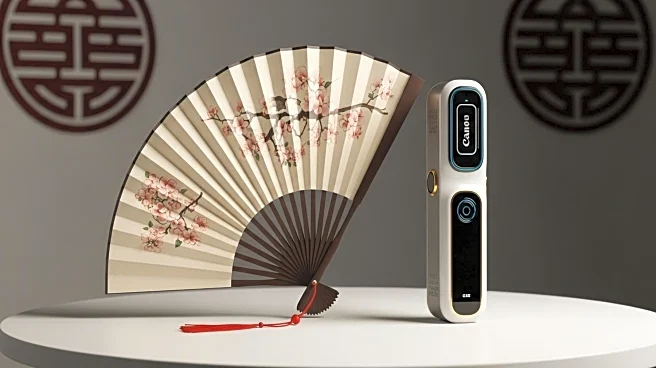What is the story about?
What's Happening?
China is increasingly focusing on exporting its own innovations, marking a shift from its traditional role as the world's factory. This transformation is exemplified by the global popularity of Pop Mart's Labubu collectible dolls, which symbolize China's growing identity as a creator of cultural content. Chris Pereira, CEO of iMpact, highlights that China is now exporting electric vehicles, smartphones, consumer drones, and more, indicating a broader trend across various sectors. Deng Chenger, a researcher at King's College London, notes that Labubu and other cultural exports like the video game Black Myth: Wukong and the animated film Ne Zha 2 reflect the increasing global resonance of Chinese-origin intellectual properties. The shift is not just about the products themselves but also about the perception of these products as desirable, akin to the lifestyle representation of Apple's iPhone.
Why It's Important?
This strategic pivot towards creativity and innovation is significant for China's global influence and soft power. By exporting cultural products that resonate globally, China is enhancing its international image and economic footprint. The rise in Chinese brands in the Brand Finance Global 500, from 13 to 68 over 17 years, underscores this trend, with their total brand value increasing to $1.4 trillion. This shift could lead to increased cultural exchange and influence, as well as economic benefits from new markets. However, the strategy faces challenges, as mixed feedback from global audiences could impact its success. The 'cool China' narrative may evolve due to geopolitical factors, but the focus on creativity is expected to persist.
What's Next?
China's strategy involves welcoming international visitors to experience its culture firsthand, thereby fostering global storytelling about China. This approach aims to cultivate soft power by allowing others to share their experiences and perceptions of China. The unilateral visa-free policies are part of this strategy, encouraging more people to visit, work, or live in China. As China continues to prioritize creativity, it will likely face hurdles related to geopolitical tensions and varying global perceptions. The ongoing development of cultural exports and innovations will be crucial in maintaining and expanding China's influence.
Beyond the Headlines
The shift from manufacturing to innovation in China's export strategy has deeper implications for global cultural dynamics. It challenges traditional perceptions of China as merely a manufacturing hub and positions it as a significant player in the global cultural landscape. This transformation could lead to long-term shifts in how Chinese culture is perceived and integrated worldwide, potentially influencing global cultural trends and consumer preferences. The strategy also raises ethical considerations about cultural influence and the balance between global integration and national identity.

















